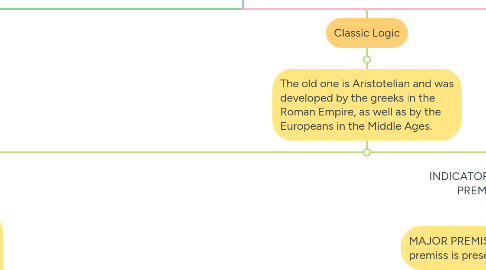
1. Concept, Judgements and Reasoning
1.1. Judgement
1.1.1. Mental operation that enunciates the relationship that exists between two or more concepts.
1.2. Concept
1.2.1. Mental representation of an object, and it is the simplest element of thought.
1.3. Reasoning
1.3.1. Implies the coherent relation between two judgements or propositions to obtain a new judgment as a conclusion.
1.3.1.1. TYPES OF REASONING
1.3.1.1.1. Inductive
1.3.1.1.2. Deductive
2. New node
3. Argument
3.1. Is the object of study of logic,which is a branch of philosophy which deals with the study of rules and forms of valid reasoning that goes through various procedures and methods.
3.1.1. Premisses P
3.1.1.1. Propositions that offer reasons, justify and lead to the conclusion.
3.1.1.1.1. Logic Indicators
3.1.2. Conclusion
3.1.2.1. General propositions followed by the premisses.
3.1.2.1.1. Logic Indicators
3.2. Rules for the formulation of an Argument:
3.2.1. 1.- Ask yourself, what am I trying to prove?, what is the conclusion I want to defend?
3.2.1.1. 2.- Write the conclusion followed by the reasons that justify it, presenting the nuclear and subsidiary premisses.
3.2.1.1.1. 3.- Choose reliable premisses to support your conclusion
4. Logic Principles
4.1. This type of principles do not need to be demonstrated, this is because they are obvious.
4.1.1. Principle of non-Contradiction
4.1.1.1. Explains that nothing can be and not be at the same time. It falls in sense. If something is true, then the opposite of it is false.
4.1.2. Principle of identity
4.1.2.1. Explains that what is, is. It states that each thing is identical with itself. It tells us which judgments are necessarily true.
4.1.3. Principle of Excluded Middle
4.1.3.1. Explains that a statement must be affirmed or denied; there is no in between. States that for every proposition, either this proposition or its negation is true.
4.1.4. Principle of Sufficient Reason
4.1.4.1. It is necessary to have reasons to know if a premiss is true or false.
5. Classic Logic
5.1. The old one is Aristotelian and was developed by the greeks in the Roman Empire, as well as by the Europeans in the Middle Ages.
5.1.1. PREPOSITIONS
5.1.1.1. There are four types of prepositions or judgments: according to their quantity they can be universal or particular and according to their quality they can be affirmative or negative. Each one is identified with a symbol that can be A,E,I and O.
5.1.1.1.1. DENOMINATIONS
5.1.1.1.2. SCHEME
5.1.2. INDICATORS OF LOGIC PREMISSES
5.1.2.1. MAJOR PREMISS: Generally this premiss is presented first.
5.1.2.1.1. MINOR PREMISS: Where is the subject of the conclusion or Minor Term.
5.1.2.1.2. Explains that you need foundations to decide whether a premiss is true or false. Everything must have a reason, cause, or ground.
6. New node
7. Fallacies
7.1. Attack to the person
7.1.1. This are referring to any condition of the person who issues an opinion and ignoring the contentof what he says .
7.1.1.1. ex. Someone who dresses so badly can't be right
7.2. Appeal to popularity
7.2.1. It happens when we seek to support our arguments in popular opinions and not because of the confidence that they are right .
7.2.1.1. ex. most of my city uses vape
7.3. False generalization
7.3.1. This fallacy generalizate from very few observed cases .
7.3.1.1. ex. All my friends said that Purple Hearths is the best movie, so all the people think is the best movie
7.4. Petition of principle
7.4.1. Make an argument, one of the premises is again established as a conclusion, and the cloclusion is changed to one of the premises.
7.4.1.1. ex. Alicia disappeared, and in her house, they told us she is lost.
7.5. Appeal to force
7.5.1. Consists of the use of force physical or verbal to impose a vision or opinion.
7.5.1.1. ex. if you dont clean your room can´t go to the party
7.6. Appeal to emotions
7.6.1. seeks to expose an idea that moves the feeling or pity instead of offering reasons.
7.6.1.1. ex. If i dont go with my friends i wiil ccry
7.7. Appeal to ignorance
7.7.1. is used when it is intended to offer the ignorance of something as an explanation to evade responsibility
7.7.1.1. ex. i did not know that i can not eat at class
7.8. Appeal to authority
7.8.1. It occurs when an idea or argment is not analizated but is taken for granted as correct and valid for having been issued by a person os instiution recognition on the sbject.
7.8.1.1. ex. The teacher said that if we didn't deliver the work on time, he would give us a zero, so it must be
8. New node
9. Modern Logic
9.1. Modern logic has a strong relationship with mathematics and symbolic language. It was developed in the nineteenth century by the Englishmen George Boole and Augustus De Morgan, and followed by the German mathematician Gottlob Frege.
9.1.1. Modern logic has some variants. We will focus on the study of three of them
9.1.1.1. Propositional logic
9.1.1.1.1. This logic deals with analyzing formally valid reasonings based on their propositions.
9.1.1.2. Quantificational logic
9.1.1.2.1. This logic focuses on the relationships between a quantity and the propositions, distinguishing between individuals and their predicates.
9.1.1.3. Class logic
9.1.1.3.1. This logic focuses on indicating the belonging or non-belonging of an element within a set.
